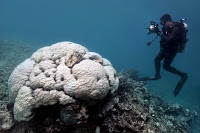The Great Barrier Reef in Australia has long been one of the world’s most magnificent natural wonders, so enormous it can be seen from space, so beautiful it can move visitors to tears.
But the reef, and the profusion of sea creatures living near it, are in profound trouble.
Huge sections of the Great Barrier Reef, stretching across hundreds of miles of its most pristine northern sector, were recently found to be dead, killed last year by overheated seawater. More southerly sections around the middle of the reef that barely escaped then are bleaching now, a potential precursor to another die-off that could rob some of the reef’s most visited areas of color and life.
“We didn’t expect to see this level of destruction to the Great Barrier Reef for another 30 years,” said Terry P. Hughes, director of a government-funded center for coral reef studies at James Cook University in Australia and the lead author of a paper on the reef that is being published Thursday as the cover article of the journal Nature. “In the north, I saw hundreds of reefs — literally two-thirds of the reefs were dying and are now dead. ”The damage to the Great Barrier Reef, one of the world’s largest living structures, is part of a global calamity that has been unfolding intermittently for nearly two decades and seems to be intensifying. In the paper dozens of scientists described the recent disaster as the third worldwide mass bleaching of coral reefs since 1998, but by far the most widespread and damaging.
The state of coral reefs is a telling sign of the health of the seas. Their distress and death are yet another marker of the ravages of global climate change.
Read more at Large Sections of Australia’s Great Reef Are Now Dead, Scientists Find

No comments:
Post a Comment